Early in 2013, to mark hundred years of Indian cinema, I dedicated an entire month to regional Indian cinema. I reviewed several films of different languages, and realized, in the process, just how difficult it is to get hold of old regional films that have subtitles. Even when they’re blockbuster hits, National Award-winning films, films that must have been subtitled at some stage to enable a jury to judge them worthy of a prestigious award.
Among the films that I came across, but which wasn’t subbed, was this extremely popular Punjabi film, which won the National Award for Best Feature Film in Punjabi, as well as the National Film Award for Best Music Direction. My husband’s a Punjabi but speaks the language very rarely, and that too when he has no other option (as a result, his Punjabi is pretty shaky). As for me, the less said about my Punjabi, the better. But I had this film bookmarked from 2013, and when I discovered last year that Nanak Naam Jahaaz Hai had been digitally restored and re-released, I thought I may as well take the plunge.
Nanak Naam Jahaaz Hai begins in 1947, with two dear friends—Gurmukh Singh (Prithviraj Kapoor) and Prem Singh (Suresh)—setting up a forest contract business. They go to the gurudwara to seek blessings for this venture, and we are then treated to a brief vignette to show just how dear these two men are to each other. Gurmukh Singh waits for Prem Singh for lunch, and when Prem Singh arrives, chiding his pal for waiting, it is to be admonished right back: how dare he think Gurmukh would eat on his own? They are more like brothers than friends.
As time passes, the business succeeds, bringing in much wealth for both Gurmukh and Prem Singh. If there was one sorrow (says a voiceover), it was that Gurmukh Singh and his wife (Veena) remained childless. But, twelve years after their marriage, they have a son, who is named Gurmeet Singh, and all is joy.
But now that Gurmukh Singh and his wife are parents, they decide it’s about time Prem Singh got married too. Gurmukh Singh’s wife insists she’s found the perfect bride for Prem: a girl named Ratan Kaur (Nishi Kohli). Pretty, effervescent, she will be a good wife. Prem Singh, shy and reluctant, does not even want to go and see Ratan, let alone marry her, but Gurmukh and his wife insist, and at the celebrations following the wedding, the shy smiles and glances between Prem and Ratan make it obvious that Ratan has managed to win over her bridegroom very quickly.
Ratan soon settles down, and becomes very fond of Gurmukh’s baby, on whom she showers much affection. Gurmukh’s wife is pleased, until one day, when she goes to invite Ratan to come to the gurudwara with her. Ratan, busy painting her nails, replies that she’s planned to go to the cinema with her friends; wouldn’t Bhabhi like to come along with them, too? Gurmukh Singh’s wife refuses. She’s disappointed, but does not push the matter.
Years pass. Ratan’s brother Shukarguzaar ‘Shuka’ Singh (IS Johar), a wastrel who spends all his time admiring himself in his handheld mirrors, has been telling his sister that she’s got a bad deal here. She has no children of her own and has been expending all her love on Gurmeet, but what does she get out of this? This is all a ploy on the part of Gurmukh Singh and his wife to make sure that when Prem and Ratan pass on, Gurmeet will inherit all their wealth too.
Ratan laughs it off, but by the time Gurmeet Singh (now Som Dutt—Sunil Dutt’s younger brother) has grown up, Ratan too is singing the same tune as Shuka. Spurred on by Shuka, she even starts accusing Gurmukh Singh of having embezzled money from the business. Prem Singh refuses to believe this and refuses, too, to have anything to do with Ratan’s mad accusations about the man he regards as his brother.
So Ratan goes off on her own and files a case. Gurmukh Singh, when he gets the summons, comes to Ratan, pleading with her to withdraw the case: doesn’t she know, too, that he is innocent? This will dishonour all of us, he tells her, and begs Ratan to retract. Ratan refuses, and flounces off, saying that the court will decide.
Gurmukh Singh, in a poignant little scene, goes to the gurudwara and prays. Prays that this case may be won by Ratan, because that is the only way peace will be restored. He knows Ratan all too well by now: she is too bitter, too greedy and too selfish to be quietened by anything less than victory. Even if it be at his own cost, Gurmukh Singh is willing to bear the humiliation—if only it will pacify Ratan. He realizes too, that it was at his insistence, and his wife’s, that Prem married Ratan. They are, in a way, to blame.
But God has other things planned. The court decides in favour of Gurmukh Singh, and Ratan is penalized Rs 80,000.
Ratan gets so wild at her brother Sukha that he, in an attempt to quieten her, promises he’ll settle Gurmukh Singh’s hash once and for all, and get the money out of him. He goes off towards the gurudwara (where Gurmukh Singh is singing, in front of a large congregation) and climbs a tree to get a closer look. Unfortunately for Sukha, a snake that’s curled up on a branch lunges at him. Sukha falls off and breaks an arm…
… and accounts for it by telling Ratan that twelve of Gurmukh Singh’s henchmen thrashed him. Ratan is so furious that she forces Prem Singh to take Sukha along to the police station and have an FIR filed; the inspector, after all, is Prem’s old pal, isn’t he? Prem isn’t especially keen, but has no option.
As luck would have it, the inspector (Jagdish Raj, who else? He seems to have specialized in cop roles, even outside Hindi cinema) happened to have been in the gurudwara, listening to Gurmukh Singh’s singing at the time. He knows Sukha is telling lies, so Sukha is shooed away with a warning.
To Ratan’s surprise, she receives a visitor soon after: Gurmukh Singh comes, bringing a box full of money. Rs 80,000, so that she can pay the penalty imposed by the court. He warns her not to tell Prem Singh, because Prem will insist on returning the money to Gurmukh. Ratan is more than happy to not just accept the money, but to keep it a secret from her husband as well.
Ratan’s fury has affected her love for Gurmeet too; she and Sukha now travel to Amritsar to break up the match that Gurmukh has arranged between Gurmeet and a girl named Charanjeet ‘Channi’ Kaur. Channi’s mother refuses to break off the match; why should she? Ratan and Sukha are put out, but there’s little they can do about it.
We are now introduced to Channi (Vimmi) herself, as she travels home by train to Amritsar. Channi is on her own when she enters a compartment, and discovers that it’s already occupied—by none other than the man to whom she’s already been promised. Channi and Gurmeet recognize each other by the photos they both carry with them, and soon fall in love while eating apples and chatting in the train.
When they run into each other at the Golden Temple, Channi invites Gurmeet home, and he—after some hesitation—consents.
Gurmeet arrives at their home the next day, and an excited Channi rushes to the kitchen and fetches him a glass of milk. Just as she’s holding out the glass to him, who should come into the room but Ratan herself? (Despite the disagreement with Channi’s mother regarding the engagement, Ratan seems to have no qualms about staying on here). Ratan is furious when she sees Gurmeet and Channi, so obviously in love.
Ratan starts yelling abuses at Channi and Gurmeet. In her fury, she also lashes out, flinging the glass of milk aside. It goes flying, straight into the framed, glass-fronted picture beside Gurmeet. The glass of the picture shatters, right in Gurmeet’s face, the splinters flying into his eyes. Gurmeet, to his horror, suddenly finds himself gone blind. Ratan is shocked at what has happened, but it’s too late now.
Or is it? Gurmukh Singh, his wife and Prem hurry to Amritsar and cluster around when the doctor (Tiwari) carefully undoes the bandages a few days later. He’s warned the family that there is no knowing whether or not Gurmeet will have regained his vision, but everybody’s been praying hard… And no, Gurmeet cannot see. He is still blind as ever, blind and helpless.
I must admit that at this stage, I pretty much gave up on this film. I’ve seen countless Hindi films of this sort (Aarzoo, Hum Dono, and Bheegi Raat come immediately to mind), where one half of a pair, suddenly crippled or rendered less-than-perfect, decides that they will be a burden on their beloved, and therefore either disappears or cooks up a farce to hoodwink the sweetheart into thinking the worst, or outright calls a halt to the proceedings.
The last-named is what happens in this case. Gurmeet tries to call off the engagement, and when Channi refuses to break it off, he decides that he will set out on a pilgrimage, going from one gurudwara to another. Prem Singh, who has been blaming himself for this tragedy (his contention being that if he had not married Ratan, she wouldn’t have come into their lives and destroyed their happiness), offers to come along as companion.
But, unlike the usual Hindi film, Nanak Naam Jahaaz Hai takes a somewhat different turn, and one which I found touching enough to shed a few tears over. It is melodramatic, make no mistake; but it is also, in its own way, poignant.
What I liked about this film:
Its message of forgiveness and of repentance. I had expected a good deal of religion here (the very name of the film is an indicator of that), and it was there, in big doses, all the way from its songs to the brief tour of the Golden Temple which occurs at one point (where a guide explains to Channi the significance of various treasures at the temple), down to the very graphic paintings depicting the martyrdom of the Sikhs. I tend to get impatient with extended displays of religious fervour, and Nanak Naam Jahaaz Hai did come close to making me impatient.
Fortunately, this was balanced by a subtler, more endearing message, that of repentance and of forgiveness. Ratan, unlike the ‘evil till she gets her comeuppance’ sister-in-law/daughter-in-law of films like Bhabhi, Chhoti Bahen, and other similar (mostly AVM Productions films), is not incorrigibly and unrealistically evil. When she realizes the enormity of her actions, she is so ashamed and repentant that she does all she can to make up for it. It doesn’t take long-drawn-out admonitions and appeals to her better self for Ratan’s eyes to be opened.
As for Gurmukh Singh, his wife and Gurmeet, too, their piety shows in the way they forgive Ratan without heaping martyrish scorn on her. They realize that what happened was an accident, and forgive Ratan because even if her anger made her lash out, the consequences of that anger, they know, are not what Ratan would have wanted.
The cast, especially Prithviraj Kapoor as Gurmukh Singh. The others, barring Som Dutt (who never came anywhere close to his brother when it came to histrionics), are also mostly good. One person who surprised me in this film was Vimmi, whom I’ve seen in only one other film, Humraaz, where she was unbearably wooden. Here, she was pretty good, and her character, Channi, was a feisty, spunky girl who had no qualms in telling her prospective father-in-law or future husband just what she thought of their self-sacrificing attitudes. Channi, in fact, was one of my favourite characters in the film, just because she’s such a well-rounded character: loyal, steadfast, strong-willed, yet sensitive, kind, and forgiving.
Lastly, the music, by S Mohinder. Nanak Naam Jahaaz Hai has some good songs, of which my favourite is Mittar pyaare nu. Beautifully sung my Mohammad Rafi, it’s a poignant, lovely song.
What I didn’t like:
The melodrama near the end. There is melodrama throughout (this is a drama-heavy film, and sometimes the drama goes into excessively high gear), but near the end, it gets just a wee bit too much.
Still, all in all, not at all a bad introduction to Punjabi cinema.
And yes, a little bit of trivia: The backdrop to the opening credits, which continues for a while after the credits have ended, is a scene of some important gathering on religion. Among the people I recognized here were a very young Dalai Lama (also shown speaking) and Khan Abdul Ghaffar Khan (if I’m not mistaken).

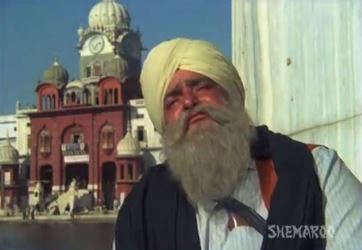
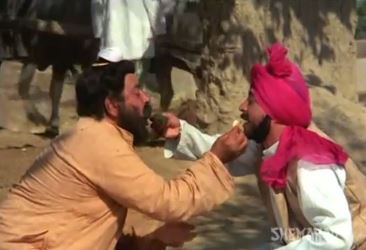
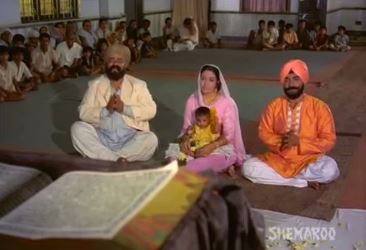
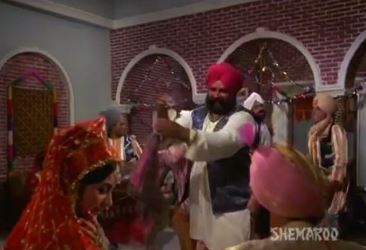
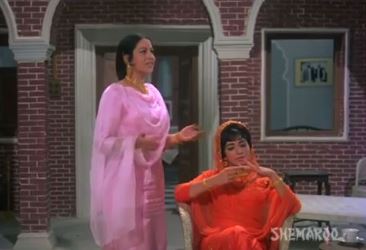
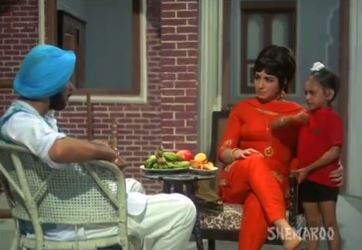
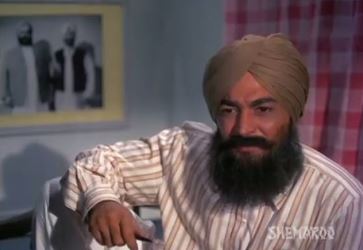


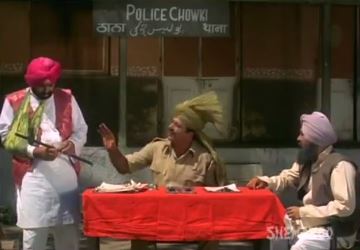

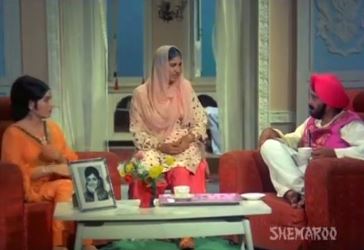
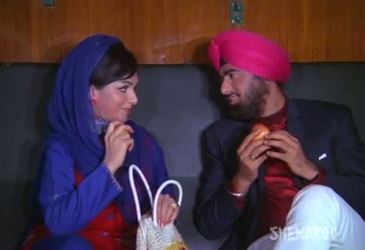
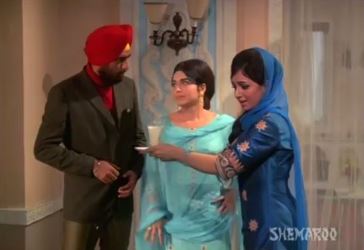
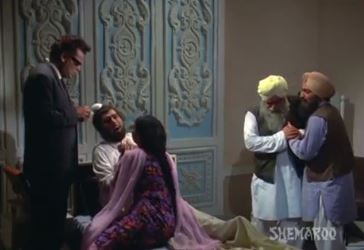
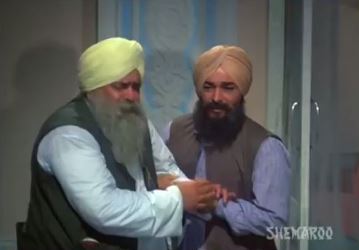
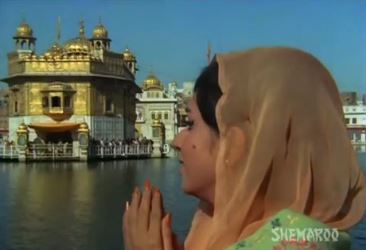
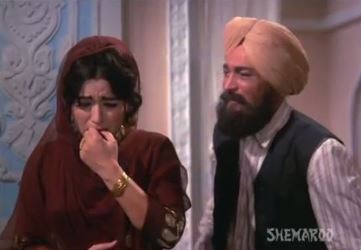
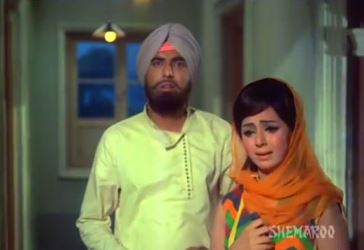
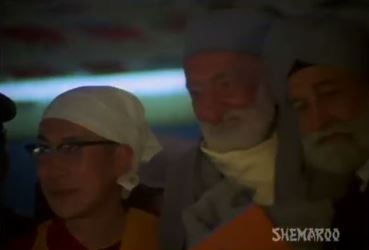
Funny, you should bring this film up. Just a few days back, Karan Bali on Upperstall mentioned Vimmi’s role in this movie. And I’ve been hearing about this movie form other quarters as well.
Nice review!
LikeLike
That’s an interesting coincidence. What did Karan Bali have to say about Vimmi’s role in this film?
Thank you, Harvey, for the appreciation. :-)
LikeLike
His words were, ” The one silver lining for Vimi was the Punjabi devotional film, Nanak Naam Jahaz Hai (1969). The film celebrated a silver jubilee and is regarded as a classic today with many old-timers calling it the greatest Punjabi film ever made in India. Along with Prithviraj Kapoor, Suresh, IS Johar and Nishi, Vimi too made a fine impression in the film as Som Dutt’s dutiful girlfriend and wife-to-be who accompanies him on a pilgrimage around the various holy shrines of the Sikhs to help him get his eyesight back.”
You can read the article here:
http://upperstall.com/profile/vimi/
LikeLike
Maybe you’ll find this interesting too
http://comic-guy.blogspot.co.at/2012/05/vintage-articles.html
LikeLike
Interesting, yes. :-)
“The first article is about the tragic story of beautiful actress ‘Vimi’ who once charmed the silver screen with his beauty in movies like ‘Hamraaz,Vachan,Patanga’ “
LikeLike
Ah, okay. Thank you for sharing that, Harvey! I don’t agree with Karan Bali’s assertion that Vimmi’s performance in Humraaz is understated – I do think she was wooden – but yes, it’s a good article. Really quite sad about how she ended up. I remember a long discussion about that on my Humraaz post.
LikeLike
Madhu,
By the time I read through half the review, I was wondering what there was in this film for it to be awarded a National Award. It seemed like any other melodrama, made worse because of the religious overtones. But it seemed to have redeemed itself in your eyes, so now I’m wondering whether I should give in a watch. After all, there’s Prithviraj Kapoor to leaven the experience. (In that screenshot, he looked so much like Shammi Kapoor in Vidhaata. [Or vice versa])
LikeLike
Anu, I was wondering why this film, though not bad, won a Nationa Award. But the answer probably lies in the details: the National Award for Best Feature Film in Punjabi. Maybe Punjabi cinema back then was pretty abysmal, I don’t know.
While Prithviraj Kapoor is very good in this, his role in the second half is fairly little – and that half of the film was, to me, a little offbeat, compared to the first half (though the fag end of it is somewhat like Shirdi waale Sai Baba, deja vu). And yes, there’s a lot of religion; even most of the songs are religious in tone. I found the faith of these people touching – not just their faith in the benevolence of their deity, but also faith that whatever their God decreed would be eventually best for them. And the religion of the religious made them better, kinder, sweeter people… all of which made me like it.
But I don’t think I’d advise you to see it. It’s not got ‘religious overtones’; it’s an outright devotional film.
LikeLike
But I don’t think I’d advise you to see it.
Why? Because I’m agnostic? :) I like well-made religious films, actually. Unless that’s an oxymoron. I like people’s faith, even if I don’t have any. Especially because I don’t have any, I suppose. It is an aspirational view – I think it would be nice to believe. That I can’t is my personal flaw.
LikeLike
Ah, okay. If that is so, then I won’t dissuade you. Though I do admit that I liked the fact that this film brought out the importance of faith making you a better, more forgiving person, not just getting you brownie points with the divine. :-)
LikeLike
I rushed off to see the movie in theater when it re-released. The excessive religious doses gave me a massive headache. All I remembered of this film was that it was one of the biggest films of Punjabi language. During the 80s I was in Amritsar visiting relatives when this film was being shown on Doordarshan. Everyone was watching the film with utmost reverence. I think it was significant for the Sikhs as it shows all the Gurudwaras. A little like a pilgrimage without setting a foot outside the house.
Som Dutt was such a bad actor. But we had Veena, Prithviraj, Suresh and IS Johar to offset that.
Vimmi was really surprising in this film. Maybe she was improving as an actor. It is too bad that she got sidetracked, because she was so pretty, and with even half way acting skills she would have seen more success. I was intrigued by her because she worked in some very popular films, without being credited for being a good actress. And then, if you look closely, even if her expressions are not good, her diction is always faultless. It seems she worked in radio for a while before starting in films.
Back to this film, were you surprised during the last scene? Did it not remind you of Amar Akbar Anthony? This movie came before AAA so we can assume that the ‘divine light’ idea was copied from here.
LikeLike
“Back to this film, were you surprised during the last scene? Did it not remind you of Amar Akbar Anthony?”
I just saw your comment, Ava, after having replied to Anu’s comment – where I mentioned that the last scene has a definite Shirdiwaale Sai Baba deja vu. Yes, I would assume this is where Manmohan Desai got the idea from. :-)
Vimmi came as such a surprise here. I’d been dreading seeing her in this, because my experience of Vimmi is that of the patthar ki moorat – so hopelessly wooden. But she was so pleasantly believable here, all through. No, she’s no Nutan or Waheeda Rehman, but she’s certainly not bad. Maybe she improved on her acting after Humraaz, and maybe it was also a question of who was directing her, and how…
I actually really enjoyed that song which is picturised in different gurudwaras, not so much for the song itself (I somehow didn’t find Asha Bhonsle’s voice very convincing as a Punjabi – though that’s just me, I suppose), but for the gurudwaras, so interesting. I kept hoping they’d make it to Hemkunt Sahib, but that was perhaps expecting too much. ;-)
LikeLiked by 1 person
That song covering various gurudwaras should be of some significance now. I am sure they are all built over with lots of marble and all that. It is difficult to see simple gurudwaras these days.
LikeLike
Yes. Even the gurudwaras that aren’t marble clad seem to be very ornate otherwise – there’s one near our house that’s like that. I recognized a couple of the gurudwaras of Delhi in that song.
LikeLike
I forgot to mention Nishi’s name when listing the ‘good’ actors. She was so good. I also loved the clothes that Nishi and Vimmi wore. Very pretty.
I wonder if you noticed, Nishi wears the same Pajami kurta when Gurmeet is a little child, and when he is fully grown. We should ask her how she kept her clothes in such a tip top condition.
LikeLike
Not only did she keep her clothes in such good condition, she was able to still fit into those clingy churidar-kurtas – that was what impressed me!
LikeLiked by 1 person
Oh yes! hehe. How could I forget that.
LikeLike
Not to mention that, for someone supposedly so fashionable (doing up her nails and going to the movies instead of the gurudwara?!), Ratan pays no heed to changing fashions between 1947 and 1969? Kya re.
LikeLiked by 1 person
Hahaha you are on a roll now! Same eye makeup in both the eras.
I kind of liked the haw-hai that Nishi must have triggered over the ‘Nails and movies over Gurudwara’.
LikeLike
“I kind of liked the haw-hai that Nishi must have triggered over the ‘Nails and movies over Gurudwara’.”
Yes. That was seriously politically incorrect. And with such brilliant nonchalance.
LikeLiked by 1 person
You people are so mean!!
Love it :)
LikeLike
Mean? Why? :-D We are saying we’re thoroughly impressed. :-) That’s a compliment! I can’t fit into clothes from five years back, let alone 20.
LikeLike
Such a detailed review
LikeLike
That’s the usual style of my reviews. And the usual length.
LikeLike
You have no idea how happy I became when I saw this pop up in my inbox (regional affinity probably :-P)
When the film had first come out, I didn’t get to watch it immediately. But my father bought a copy of the audio tape. I loved all the songs or shabads as we referred to them. On the reverse side of that audio tape were songs (or shabads) from another movie ‘Dukh Bhanjan Tera Naam’. Again, a story of sacrifice and faith in God- I think it came about around the same as this film. If you can, do listen to the songs- I wouldn’t recommend the movie because it was annoyingly sappy and soppy. In case you do feel inclined, may I suggest another Punjabi film, with a really good soundtrack? ‘Uccha Dar Babe Nanak Da’- it has Gurdas Maan in the lead. The songs are good but I could be biased because I think Gurdan Maan is a wonderful Punjabi singer. You must understand that I grew up listening to these songs because I am a Sikh.
It was much later that I got to watch ‘Nanak Naam Jahaz Hai’. And I know what you mean about religious films. They have such strong moral under currents that it can be quite sickening. Luckily for me, my parents were never religiously inclined and so apart from such gestures as listening to shabads in the car, we never did anything particularly religious or pious. Which is why I could enjoy both ‘Uccha Dar Babe Nanak Da’ and ‘Nanak Naam Jahaz Hai’ as films.
But I have to admit I didn’t like Pritiviraj Kapoor too much in this film or maybe my memory doesn’t serve me well- I remember him crying a lot.
LikeLike
That’s an interesting comment, Simrita (and, by the way, every time you comment, I am reminded of a very dear friend of mine, who has the same name as you. In fact, she was the very first person to comment on this blog post – though she commented on Facebook, not here). I have seen, in the sidebar on Youtube, the thumbnails for the other movies you’ve mentioned. I’m unlikely to watch them (unless they’re from before the 70s), but I just might listen to the songs.
Now to what really struck me about your comment.
“Luckily for me, my parents were never religiously inclined and so apart from such gestures as listening to shabads in the car, we never did anything particularly religious or pious. Which is why I could enjoy both ‘Uccha Dar Babe Nanak Da’ and ‘Nanak Naam Jahaz Hai’ as films.”
For me, I think the reason why I liked this film was that I’m fairly religious. I’m Christian, and though I may not be a very frequent churchgoer, my faith is very strong – so seeing people have such a deep faith, and that faith actually helping them get through bad times (which I can vouch for – I actually managed to pull myself out of serious depression by using faith as an anchor) resonated with me. I also liked the fact that the film shows religion as being something that can help you be a better person: Gurmukh Singh and his wife, for instance, are perhaps more forgiving, more humble, because of their faith. Not that that is very real, but still. :-)
Prithviraj Kapoor does have some fairly emotional scenes, but not much crying.
LikeLike
Sorry, took so long to reply. Have been having a terrible time with a lot of work and also, managing to mess my head on a personal level. Which is why I kept coming back to your comment. Let me explain. I think, I have come to equate being religious (in this case being a Sikh) with the very physical embodiment of it – like keeping the five K’s or at least the hair, praying every day etc. So, though my father goes to a gurudwara daily without fail, because there are no such compulsions on us or any compulsion to maintain long hair (Dad actually had to cut his hair in 1984) or pray daily, I just think of us as being non- religious in that sense. (Mind, I don’t think of my family as being spiritual either – I think we are eclectic where we do what we think works best for each of us).
Now, recently I have been letting myself get overwhelmed with work and what not, and slowly I have been inching towards my prayers and meditation once again and been having these strong urges to go and just sit in a gurudwara (somehow, what they do for me, no other temple has ever managed) and I know, somehow that that will help me. This has happened in the past and then it was Bangla Sahib which did wonders for me. So I kept reading your comment and wondering whether, maybe, I enjoyed the movie because it was a story, but equally it was about just surrendering yourself to someone or something, knowing it will be alright. I have always been in awe of those who have managed to do it. I don’t know whether this is what you mean by faith.
Gosh- now I want to go watch the movie again. Thanks, your reviews always gives me ideas of what I want to watch next! :-)
LikeLike
No problem, Simrita, about replying – sooner or later (or never) is fine. I remain horribly busy, so I can well empathise with anyone who’s short on time. For whatever reason.
About what you say: yes, that was what I meant by faith. I have seen different manifestations of ‘religiosity’ (I won’t call it ‘faith’) and some of them are not pleasant at all. Some of my older relatives (fortunately not my parents) believed that you couldn’t possibly be a ‘good Christian’ if you didn’t go to church every Sunday, if you didn’t participate in all the church activities, or if you didn’t abide by all the demands of Lent (being Protestants, we anyway have fewer rituals than the Catholics do). What you did outside of church was another matter – so these same people (not all of them, I hasten to add) had no qualms about being corrupt, being nasty and spiteful to other people, or just leading lives that did not conform to Christ’s teachings – of humility and gentleness and love towards all.
My belief is that it makes more sense to have a faith that teaches you all of that, that bolsters your courage and makes you a better person, than to follow each and every ritual. That is faith, for me.
LikeLike
I was surprised to see this movie reviewed, because you have mentioned several times that you are not very fond of movie bhajans and this one is full of shabads. That aside it is an excellent review as always so well written. I also enjoyed the comments, the remarks on Nishi’s attire made me laugh. I did not watch many movies growing up, this one however I did see when it was released with my grandmother. Over the years, I remembered the music but had forgotten most of the movie except the ending which I did not believe could happen. That kind of spoilt the movie for me. I watched it again years later on VHS, somehow I remember seeing the movie presented by David. I did look up the credits and IMDb, nut there is no mention of David in production other than his role as a doctor. I watched this one before watching Humraaz, so I thought Vimmi was pretty decent in acting, then the wooden look in Humraaz threw me off. Of course Humraaz was before this one, she must have improved a lot. The movie for me was a bit confusing, starting with a very strong National theme through the song “Bole so nihal”, celebrating the Sikh movement and 500th anniversary of Guru Nanak Dev, then taking total religious turn of faith. I did like the trust, forgiveness and love shown for the two families in the story, and the music. Though I.S. Johar is the villain here, I liked his style :) specially “pasa putha” and “pasa siddha payo hi payo”. His Punjabi is so good. Your review brought back a lot of the story that I had forgotten. One more great post from your pen. Enjoyed it.
LikeLike
Thank you so much, Neeru! I’m glad you enjoyed this post.
You’re right, I don’t usually like bhajans (though, as time goes by, I’m discovering several that I like a lot – offhand, I can think of at least five that are really great), but I wanted to watch a Punjabi film, out of sheer curiosity. And this one, because it had such an impressive cast (and because it had won so much acclaim) seemed to fit the bill. I think, unlike a syrupy, really OTT ‘devotional’ film like Jai Santoshi Maa (which was a pain), this one was more tempered. It wasn’t screechy, and as you so rightly put it, “the trust, forgiveness and love shown for the two families in the story made it worthwhile. Far too many devotional films are all about one’s devotion to a deity, and not enough about how one’s faith should also have an effect on one’s own life and attitude.
IS Johar was a funny villain, yes. Those stock phrases you’ve mentioned made me grin, too, and there was this hilarious dialogue near the end of the film that made me burst out laughing. He is told that Channi is praying at the gurudwara, begging Waheguru to take away her eyes and give Gurmeet’s instead – so he says, in great disgust (I’m paraphrasing here, in Hindi): “Waheguru ko kya Exchange samajh rakha hai? Meri aankhein le lo, uski aankhein de do?!”
IS Johar seems to have been really underestimated as an actor. I’ve seen him be the real star (and not just according to me, but according to a New York Times critic) of a film that starred Stewart Granger; I’ve seen him shine in roles as diverse as from Shagird to Safar… and now Nanak Naam Jahaaz Hai. I wonder if he acted in any other Punjabi films.
LikeLike
Yes, that was a funny dialog by I.S. Johar. I have always liked him, his comedy is steeped in realist remarks on religion and power of politics. He was in Yamla Jutt, Chaddiyan di doli and Do posti. His name is listed as Inderjeet Singh Johar as well as Inder Sen Johar, wonder which one is it.
LikeLike
I don’t know which one it is, either, though the only listing I’ve come across (in the expanded form) is of Inderjeet Singh Johar. I should ask my father if he knows; his elder brother was a good friend of Johar, Majnun, and the rest who were such fixtures in Roop Shorey’s films in the late 40s and early 50s.
LikeLike